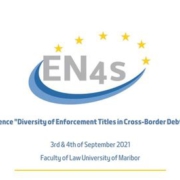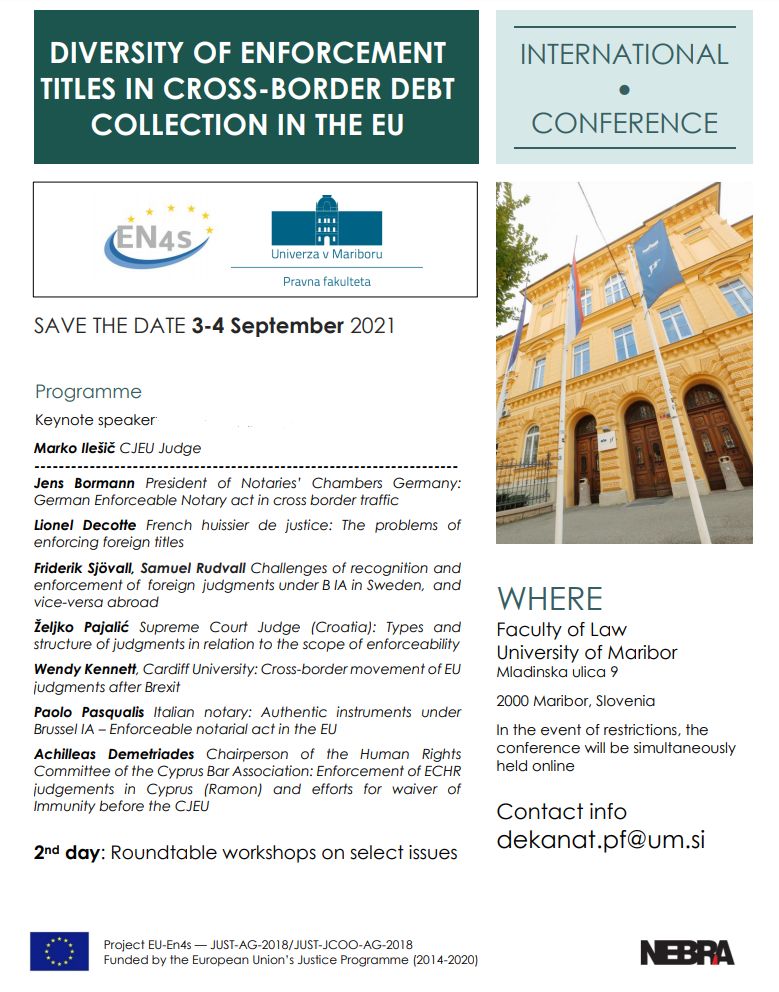The latest issue of the „Praxis des Internationalen Privat- und Verfahrensrechts (IPRax)“ features the following articles:
B. Heiderhoff: International Product Liability 4.0
While the discussion on how liability for damages caused by autonomous systems, or “artificial intelligence”, should be integrated into the substantive law is well advanced, the private international law aspect has, so far, been neglected. In this contribution, it is shown that unilateral approaches – such as the EU Parliament has suggested (P9_TA-PROV(2020)0276) – are unnecessary and detrimental. It is preferable to develop a classical conflict of laws rule with connecting factors, which mirror the assessments of the substantive law. It is shown that a mere reinterpretation of the existing Article 5 Rome II Regulation might lead to legal insecurity, and that an addition of the provision is preferable. In particular, the notion of marketing, and its importance as a connecting factor, should be revised.
K. Vollmöller: The determination of the law applicable on claims for infringement of trade secrets in contractual relationships
Subject of the article is the determination of the applicable law in cross-border situations when a lawsuit is based on the violation of trade secrets within a contractual relationship. According to German Law, claims for infringement of trade secrets are regulated in the German Trade Secrets Act (Geschäftsgeheimnisgesetz – GeschGehG) that has implemented the European Directive 2016/943 on the protection of undisclosed know-how and business information (trade secrets) against their unlawful acquisition, use and disclosure. The focus is on the question how tort claims are connected if the contracting partners have agreed on confidentiality terms, in particular under a non-disclosure agreement. In case the agreement of the parties is ruled by the laws of a Non-European state, it is doubtful whether the harmonized European trade secret law is applicable. The author comes to the conclusion that a secondary connection to the jurisdiction governing the agreement according to Art. 4 Paragraph 3 Rome II Regulation should be limited to relationships where the parties have assumed further contractual obligations beyond confidentiality. In this case, the law applicable on the contract overrides the harmonized European trade secret law regulations which cannot be considered as mandatory rules either.
T. Lutzi: Ruth Bader Ginsburg – Internationalist by Conviction
In Ruth Bader Ginsburg, the Supreme Court has not only lost an icon of gender equality and towering figure, but also a great internationalist. Ginsburg’s jurisprudence was characterised by her own academic background as a proceduralist and comparativist, a decidedly international perspective, and a firm belief in a respectful and cooperative coexistence of legal systems. An English version of this text can be found at www.iprax.de/de/dokumente/online-veroeffentlichungen/
C. Kohler: Dismantling the „mosaic principle“: defining jurisdiction for violations of personality rights through the internet
In case C-194/16, Bolagsupplysningen, the ECJ ruled that, according to Article 7(2) of Regulation (EU) No 1215/2012, a legal person claiming that its personality rights have been infringed by the publication of incorrect information on the internet and by a failure to remove comments relating to it can bring an action for rectification of that information, removal of those comments and compensation in respect of all the damage sustained before the courts of the Member State in which its centre of interests is located. On the other hand, an action for rectification of that information and removal of those comments cannot be brought before the courts of each Member State in which the information published on the internet is or was accessible. Thus, the ECJ’s decision in case C-509/09 and C-161/10, eDate Advertising a.o., also applies where the aggrieved party is a legal person. However, the “mosaic principle” defined in that judgment is inapplicable because an action for rectification and removal of information on the internet is “single and indivisible” and can, consequently, only be brought before a court with jurisdiction to rule on the entire damage. The author welcomes this limitation and advocates that the mosaic principle be given up entirely, particularly as it does not find resonance on the international level.
P. Mankowski: Consumer protection under the Brussels Ibis Regulation and company agreements
Company agreements pose a challenge to Arts. 17–19 Brussels Ibis Regulation; Arts. 15–17 Lugano Convention 2007 since these rules are designed for bipolar contracts whereas the formers typically are multi-party contracts. This generates major problems, amongst them identifying the “other party” or answering how far a quest for equal treatment of shareholders might possibly carry. Arguments from the lack of a full-fledged forum societatis might weigh in, as do arguments from the realm of European private law or possible consequences for jurisdiction clauses in company statutes. The picture is threefold as to scenarios: founding and establishing a company; accession to an already established company; and derivative acquisition of a share in an already established company.
W. Wurmnest/C. Grandel: Enforcement of consumer protection rules by public authorities as a „civil and commercial matter“
In case C-73/19 (Belgische Staat ./. Movic) the European Court of Justice once again dealt with the delineation of “civil and commercial matters” (Art. 1(1) of the Brussels Ibis Regulation) when public authorities are involved. The Court correctly classified an action brought by Belgian authorities against Dutch companies seeking a declaration as to the unlawfulness of the defendants’ business practices (selling tickets for events at prices above their original price) and an injunction of these practices as a “civil and commercial matter”, as the position of the authorities was comparable to that of a consumer protection association. Furthermore, the Court clarified its case law on the thorny issue as to what extent evidence obtained by public authorities based on their powers may turn the litigation into a public law dispute. Finally, the judgment dealt with the classification of various ancillary measures requested by the Belgian authorities. Most notably, a request by the authorities to be granted the power to determine future violations of the law simply by means of a report “under oath” issued by an official of the authorities was not a “civil- and commercial matter” as private litigants could not be granted similar powers under Belgian law.
R. Wagner: Jurisdiction in a dispute with defendants in different member states of the European Union
The article discusses a court ruling of the Higher Regional Court of Hamm on jurisdiction concerning the “Diesel emission scandal”. The plaintiff had his domicile in Bielefeld (Germany). He bought a car in Cologne (Germany) where the seller had his domicile. Later on, the plaintiff brought an action for damages and for a declaratory judgment against the seller, the importer of the car (domicile: Darmstadt, Germany) and the producer of the car (domicile: in the Czech Republic) before the District Court of Bielefeld. The plaintiff argued that the producer of the car had used illegal software to manipulate the results of the emissions tests. He based his claim on tort. Against the first defendant he also claimed his warranty rights. In order to sue all three defendants in one trial the plaintiff requested the District Court of Bielefeld to ask the Higher Regional Court of Hamm to determine jurisdiction. In its decision the Court in Hamm took into account Article 8 No. 1 of the Brussels Ibis Regulation and § 36 I No. 3, II of the German Code of Civil Procedure.
J. Wolber: Jurisdiction for an Application opposing Enforcement in cross-border Enforcement of a Maintenance Decision
The question, whether the maintenance debtor should be entitled to raise the objection that he has predominantly discharged his debt in the Member State of enforcement is highly relevant in practice and disputed in the scientific literature. The European Court of Justice (ECJ) has decided on this question – upon a request for a preliminary ruling by a German court – in the case FX ./. GZ with judgment of 4th June 2020. The ECJ confirms the jurisdiction of the German court based on Article 41 of Regulation No 4/2009. This judgment has effects beyond the enforcement of maintenance decisions on other instruments of European Law of Civil Procedure. While this judgment deserves approval in the result, the reasoning of the court is not convincing. The ECJ judgment does not cover the question of the territorial scope of such a judgment.
P. Schlosser: Clarification of the service of documents abroad
In extending the term “demnächst” (“soon”) the judgment of the Bundesgerichtshof ruled that a person interested in serving a document to somebody (in particular the initial claim) must only request the court to care for the translation and pay immediately thereafter the estimated costs of the translation for correctly initiating the litigation and thus meeting the term of limitation. The rest of time needed for the translation is irrelevant. The author is developing the impact of this decision for the three variants of serving a document to someone abroad in the European Union:
(1) Serving the document spontaneously in time together with the translation,
(2) Serving the document belated together with the translation after
the court has asked whether the respective person wants a translation,
(3) Serving initially without a translation but serving the document again together with a translation after the addressee has refused to accept service without any translation.
A. Dutta: European Certificate of Succession for administrators of insolvent estates?
German law provides for a special insolvency procedure for insolvent estates (Nachlassinsolvenzverfahren) which is subject to the European Insolvency Regulation. The Oberlandesgericht Frankfurt am Main came to the conclusion that nevertheless the liquidator of such an insolvency procedure can apply for a European Certificate of Succession under the Succession Regulation being an “administrator of the estate”. The case note argues that the German Nachlassinsolvenzverfahren falls within the scope of the Insolvency and the Succession Regulation (section II & III) and that issuing a Certificate causes only indirect frictions between both instruments which are not grave enough to invoke the conflict rule in Article 76 of the Succession Regulation (section IV). The case shows that the model of the Certificate could be extended to other areas (section V).
E. Jayme: The restitution of the „Welfenschatz“ before the U.S. Supreme Court
The US Supreme Court, in a case involving the restitution of the treasure of the Guelphs and the question of state immunity of the Federal Republic of Germany, decides that the FSIA’s exception concerning property taken in violation of the international law of expropriation does not refer to property owned by German nationals (“domestic takings rule”). The heirs of German Jewish Art dealers who had acquired a large part of the art treasure of the Guelphs from the Ducal family of Braunschweig asked for the restitution of such parts of the treasure which they had sold to Prussia in 1935 alleging that they had been unlawfully coerced to sell the pieces for a third of its value. The defendants were the Federal Republic of Germany and the Stiftung Preußischer Kulturbesitz. The plaintiffs argued inter alia that the forced purchase of the treasure had been an act of genocide in violation of international law and, therefore, justified an exception to State immunity. The District Court denied Germany’s motion to dismiss, and the D.C. Circuit Court affirmed. The Supreme Court held that the phrase “rights in property taken in violation of international law” refers to violations of the international law of expropriation and thereby incorporates the domestic takings rule. The case was remanded to the D.C. Circuit Court of Appeals for further proceedings which inter alia will concern the question whether the Jewish art dealers were German nationals at the time of the sale of the treasure (1935).
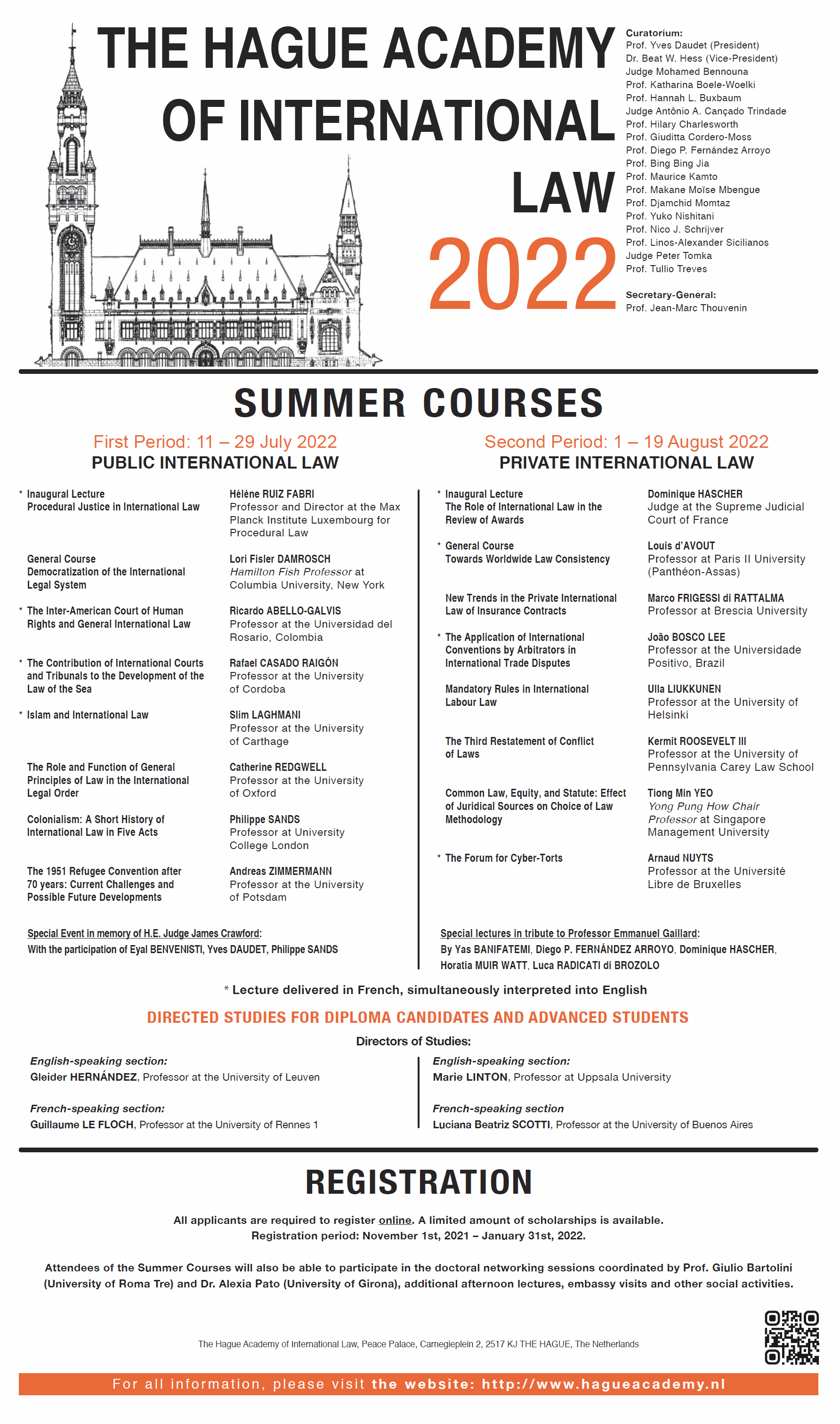

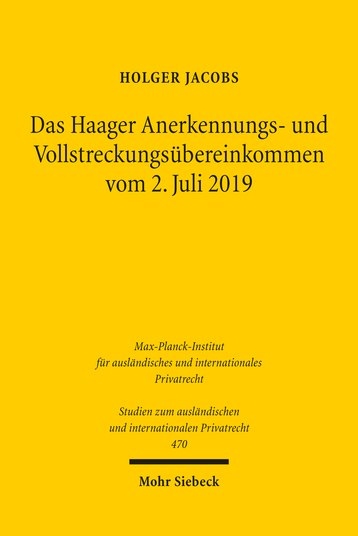

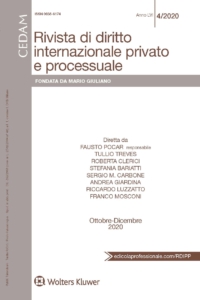 The second issue of 2021 of the
The second issue of 2021 of the 